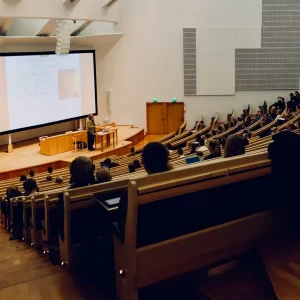Starting medical school can be a challenge, especially for those who have just left school. On the upside, your university years may be some of the best you will have — they will go by quickly.
Here are my best tips to help you in your first year.
Here are my best tips to help you in your first year.
When you go to a new place in university, you will start off not knowing anyone.
Do not let this stop you from making new friends; remember, many people think that people are judging them if they attend an event alone — do not worry, no one is judging you!
As long as you are being yourself and you are open and friendly, you will make new friends. Do not be afraid to approach people.
Regardless of whether these people are the people that you will only have a conversation with or will turn out to be your best friends, you will learn something from their experience.
Remember: everything starts with a simple “hello”.

Always be open to meeting new friends.
Do not stick to the first friend you made and think that they will be your closest friend throughout your entire degree.
Sometimes it takes a while for people to realise whether they have similar interests or viewpoints.
You may not have a great first impression of someone but may later develop a really good friendship with that person.
Being good friends in university is beyond having a lot to talk about. Sometimes it is about whether your schedules coincide or if you have time to spend with one another.
You may realise at some point in your degree that because you have a different timetable or study location as your friendship group, you may not be spending as much time with them as you would like.
You may feel like you are not close to them anymore and can’t integrate into the conversations that they have.
You want to spend more time with them but do not want it to come at the expense of your results. Do not feel bad!
You need to realise that everybody has a different schedule in university and it is okay to miss out on social events to study.
Although university life can seem as if it is about making friends, study should be your first priority. True friends will remain as friends even though you don’t see them as often.

You will be inclined to skip lectures at the start of the semester, thinking that you can always catch up later. Do not make this mistake.
Due to the great workload of medicine, you will soon find that you are missing out on the current sessions because you are still catching up on last week’s lectures.
Before you know it, the semester is coming to an end.
Remember that you need to go through a topic more than once to be able to understand and remember it well enough for the exam.
You may find that you do not remember much from week one in week 12 and need to go over it again.
The best way to deal with this is just to make sure that you are present for all lectures and academic sessions. This way, you are at least hearing the content and it will increase your recall later on.
All the effort that you put in during the semester will really matter in week 12.
Do not be too focused on what will be in the exam. Instead, focus on learning how to be a good, knowledgeable doctor.
Getting everything right may seem really important during medical school — and it is important as you can not be a doctor if you don’t pass medical school — but medical school is the only place you will be guided and allowed to make mistakes.
Everyone makes mistakes in medical school — in class, on the exam — allow yourself the freedom to make mistakes and learn from them.
If you do not learn from the mistakes, you will still have to learn the information after you graduate, only without guidance and potentially putting patients at risk.
Your medical school will also prepare many academic sessions that you may deem as “unimportant”, but remember that they are put it in your timetable for a reason.
Everything that you are learning has been reviewed by a panel many times before it is placed in your timetable — listen, learn and do your best.

Networking events may seem like they do not bring any benefit to medical school.
You may spend the whole time engaged in small talk with people and not actually having a conversation relevant to medicine.
Remember — you may connect with someone influential or inspiring. This could also be the time you find out about different opportunities, such as research projects, placement opportunities or grants.
Attend networking events if possible, particularly in your final few years when you may be looking for opportunities to add to your CV.
Placements may seem boring because you are not allowed to do a lot of “hands-on” work.
Sometimes, it can feel as though you’re watching the clock, waiting for the day to end.
Learn as much as possible by taking every opportunity as a learning experience; be curious, helpful and ask questions.
Do research on your health service area before you show up so that you can understand a lot of the presenting symptoms.
Take notice of the little things that your doctor does and develop good habits as a future doctor.
By Ying Min Teo
Ying Min Teoh was the 2018 GPSN Publications and Promotions Officer and studied medicine at James Cook University.